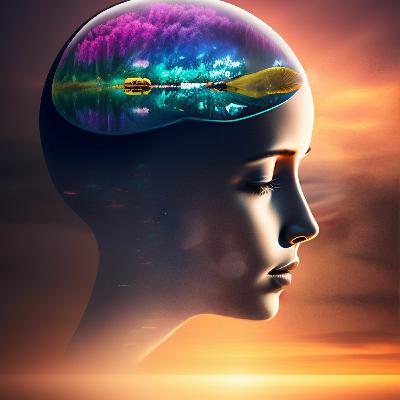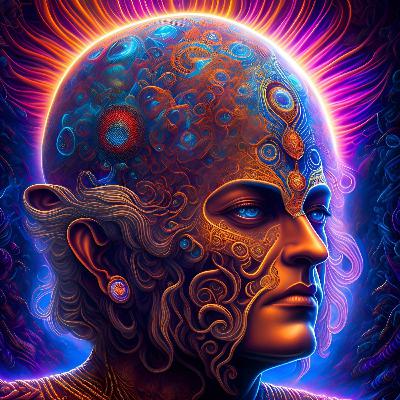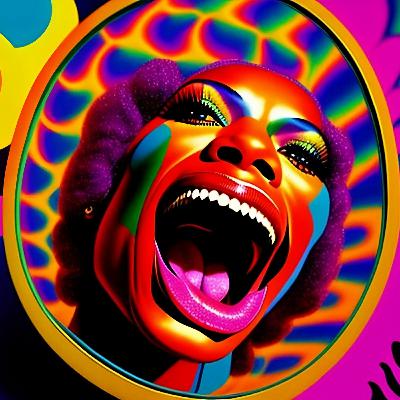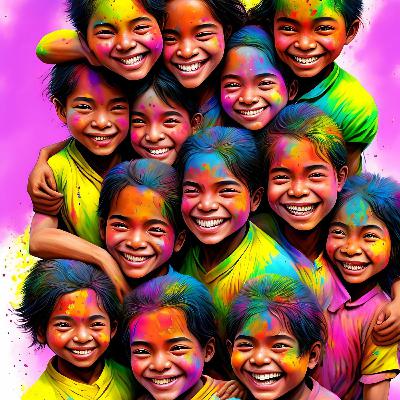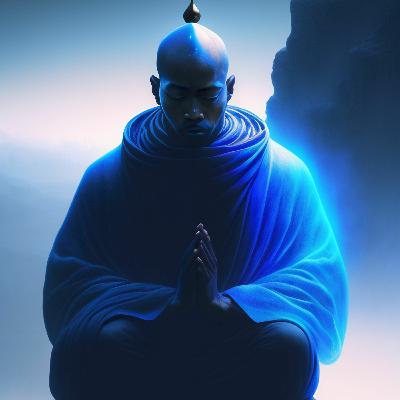The Power of Silence : Vedanta and Sankhya Philosophy - Episode 109
Update: 2023-04-22
Description
Contact: cosmicdancerpodcast@gmail.com
My E-book about Kindness on Google Books (in English):
https://play.google.com/store/books/details/Cristiano_Luchini_Kindness_days?id=1Bq1EAAAQBAJ
I like to call the short stories in the "Kindness days", colourful snapshots of the imagination; small stories imbued with spirituality, emotion and love, accompanied by beautiful illustrations by artists from five continents and as many as 14 countries: Zimbabwe, Albania , Argentina, Palestine, South Africa, South Korea, Thailand, Iran, Syria, Latvia, Poland, Ukraine, New Zealand and Guatemala.
Image produced by me.
This new series of episodes on the Cosmic Dancer podcast channel aims to disseminate the theoretical teachings of Vedanta philosophy (dating back nearly 7,000 years) through the practical experiences of daily life. This is through the involvement of guests from the world of music, art, literature, science, etc...
Vedanta is not a religion. Vedanta is a philosophy, the Mother of all world philosophies and religions. The Bhagavad Gita is the most representative text of Vedanta, one of the most widely read books ever. We celebrate the teachings of the eminent philosopher Swami Parthasarathy (96 years old), who founded the organization Vedanta Global and has authored numerous best sellers, including Vedanta Treatise - The Eternities and the invaluable commentary on the Bhagavad Gita.
Topic: The Power of Silence : Vedanta and Sankhya Philosophy.
Guest: Jayashankhar Krishnamurthy, Vedanta teacher, disciple of the eminent Vedanta Philosopher Swami Parthasarathy and Director of the Vedanta Institute of Hyderabad, India.
Sankhya is one of the six orthodox schools of Hindu philosophy that originated in ancient India. Sankhya philosophy and Vedanta have some similarities and differences. Sankhya philosophy is based on the idea of duality and the relationship between consciousness and matter. It explains that the universe is made up of two fundamental realities: Purusha (consciousness) and Prakriti (matter), and that the goal of life is to achieve liberation from the cycle of birth and death by realizing the difference between the two.
In contrast, Vedanta teaches that the ultimate reality of the universe is non-dual and that everything is a manifestation of Brahman, the ultimate reality or consciousness. It emphasizes the unity of all beings, and the goal of life is to realize this unity and achieve liberation from the cycle of birth and death.
Despite these differences, Sankhya philosophy and Vedanta share some common principles. For example, both schools recognize the existence of an individual self or soul (Atman in Vedanta and Purusha in Sankhya), and both emphasize the importance of self-realization and spiritual liberation.
Swami Vivekananda believed that by combining the practical aspects of both Sankhya and Vedanta, one can achieve a more comprehensive understanding of spirituality and its practical application in daily life. Thus, he incorporated Sankhya philosophy into his book "Practical Vedanta" to provide a practical approach to spiritual development that incorporates both schools of thought.
In what ways can the practice of Vedanta help us to access the subtle sensory essences that proliferate in the emptiness of Sankhya philosophy and to hear the "voice of intuition" that speaks through silence?
Can you explain how the teachings of Sankhya philosophy can help us to better understand the relationship between the subtle sensory essences that pullulate in the emptiness and the proliferation of words in the silence of Vedanta?
Can you provide an example of how the proliferation of words in the silence of Vedanta and the subtle sensory essences in the emptiness can be accessed in our daily lives through the practice of Vedanta?
My E-book about Kindness on Google Books (in English):
https://play.google.com/store/books/details/Cristiano_Luchini_Kindness_days?id=1Bq1EAAAQBAJ
I like to call the short stories in the "Kindness days", colourful snapshots of the imagination; small stories imbued with spirituality, emotion and love, accompanied by beautiful illustrations by artists from five continents and as many as 14 countries: Zimbabwe, Albania , Argentina, Palestine, South Africa, South Korea, Thailand, Iran, Syria, Latvia, Poland, Ukraine, New Zealand and Guatemala.
Image produced by me.
This new series of episodes on the Cosmic Dancer podcast channel aims to disseminate the theoretical teachings of Vedanta philosophy (dating back nearly 7,000 years) through the practical experiences of daily life. This is through the involvement of guests from the world of music, art, literature, science, etc...
Vedanta is not a religion. Vedanta is a philosophy, the Mother of all world philosophies and religions. The Bhagavad Gita is the most representative text of Vedanta, one of the most widely read books ever. We celebrate the teachings of the eminent philosopher Swami Parthasarathy (96 years old), who founded the organization Vedanta Global and has authored numerous best sellers, including Vedanta Treatise - The Eternities and the invaluable commentary on the Bhagavad Gita.
Topic: The Power of Silence : Vedanta and Sankhya Philosophy.
Guest: Jayashankhar Krishnamurthy, Vedanta teacher, disciple of the eminent Vedanta Philosopher Swami Parthasarathy and Director of the Vedanta Institute of Hyderabad, India.
Sankhya is one of the six orthodox schools of Hindu philosophy that originated in ancient India. Sankhya philosophy and Vedanta have some similarities and differences. Sankhya philosophy is based on the idea of duality and the relationship between consciousness and matter. It explains that the universe is made up of two fundamental realities: Purusha (consciousness) and Prakriti (matter), and that the goal of life is to achieve liberation from the cycle of birth and death by realizing the difference between the two.
In contrast, Vedanta teaches that the ultimate reality of the universe is non-dual and that everything is a manifestation of Brahman, the ultimate reality or consciousness. It emphasizes the unity of all beings, and the goal of life is to realize this unity and achieve liberation from the cycle of birth and death.
Despite these differences, Sankhya philosophy and Vedanta share some common principles. For example, both schools recognize the existence of an individual self or soul (Atman in Vedanta and Purusha in Sankhya), and both emphasize the importance of self-realization and spiritual liberation.
Swami Vivekananda believed that by combining the practical aspects of both Sankhya and Vedanta, one can achieve a more comprehensive understanding of spirituality and its practical application in daily life. Thus, he incorporated Sankhya philosophy into his book "Practical Vedanta" to provide a practical approach to spiritual development that incorporates both schools of thought.
In what ways can the practice of Vedanta help us to access the subtle sensory essences that proliferate in the emptiness of Sankhya philosophy and to hear the "voice of intuition" that speaks through silence?
Can you explain how the teachings of Sankhya philosophy can help us to better understand the relationship between the subtle sensory essences that pullulate in the emptiness and the proliferation of words in the silence of Vedanta?
Can you provide an example of how the proliferation of words in the silence of Vedanta and the subtle sensory essences in the emptiness can be accessed in our daily lives through the practice of Vedanta?
Comments
In Channel



